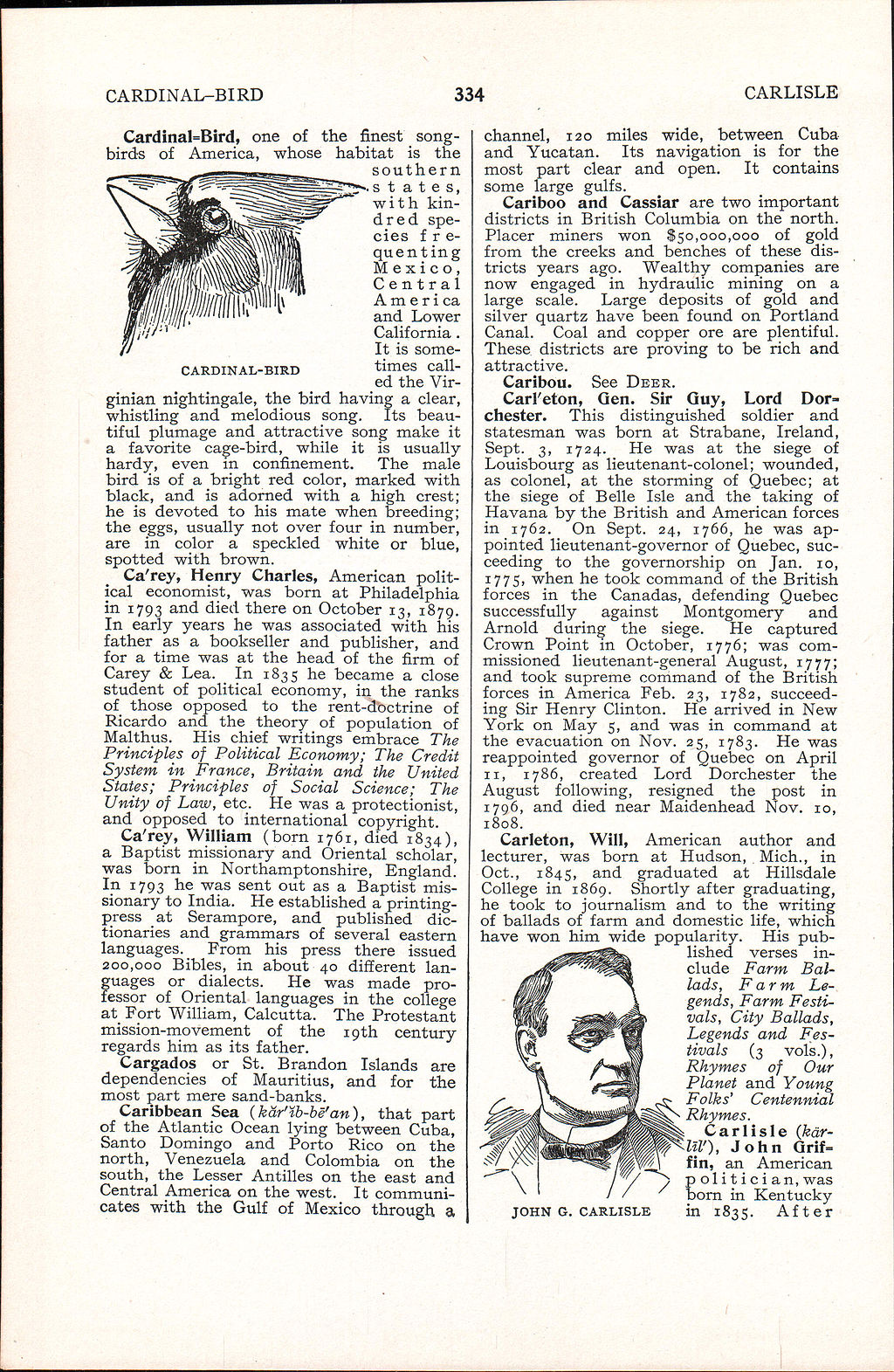CARDINAL-BIRD
334
CARLISLE
CARDINAL-BIRD
Cardinal-Bird, one of the finest songbirds of America, whose habitat is the
southern >. s t a t e s, with kindred species f r e-quenting Mexico, Central A m e r i ca and Lower California . It is sometimes called the Virginian nightingale, the bird having a clear, whistling and melodious song. Its beautiful plumage and attractive song make it a favorite cage-bird, while it is usually hardy, even in confinement. The male bird is of a bright red color, marked with black, and is adorned with a high crest; he is devoted to his mate when breeding; the eggs, usually not over four in number, are in color a speckled white or blue, spotted with brown.
Ca'rey, Henry Charles, American political economist, was born at Philadelphia in 1793 and died there on October 13, 1879. In early years he was associated with his father as a bookseller and publisher, and for a time was at the head of the firm of Carey & Lea. In 1835 he became a close student of political economy, in the ranks of those opposed to the rent-doctrine of Ricardo and the theory of population of Malthus. His chief writings embrace The Principles of Political Economy; The Credit System in France, Britain and the United States; Principles of Social Science; The Unity of Law, etc. He was a protectionist, and opposed to international copyright.
Ca'rey, William (born 1761, died 1834), a Baptist missionary and Oriental scholar, was born in Northamptonshire, England. In 1793 he was sent out as a Baptist missionary to India. He established a printing-press at Serampore, and published dictionaries and grammars of several eastern languages. From his press there issued 200,000 Bibles, in about 40 different languages or dialects. He was made professor of Oriental languages in the college at Fort William, Calcutta. The Protestant mission-movement of the i9th century regards him as its father.
Cargados or St. Brandon Islands are dependencies of Mauritius, and for the most part mere sand-banks.
Caribbean Sea (kar'tb-be'an), that part of the Atlantic Ocean lying between Cuba, Santo Domingo and Porto Rico on the north, Venezuela and Colombia on the south, the Lesser Antilles on the east and Central America on the west. It communicates with the Gulf of Mexico through a
channel, 120 miles wide, between Cuba and Yucatan. Its navigation is for the most part clear and open. It contains some large gulfs.
Cariboo and Cassiar are two important districts in British Columbia on the north. Placer miners won $50,000,000 of gold from the creeks and benches of these districts years ago. Wealthy companies are now engaged in hydraulic mining on a large scale. Large deposits of gold and silver quartz have been found on Portland Canal. Coal and copper ore are plentiful. These districts are proving to be rich and attractive.
Caribou. See DEER. Carl'eton, Gen. Sir Guy, Lord Dorchester. This distinguished soldier and statesman was born at Strabane, Ireland, Sept. 3, 1724. He was at the siege of Louisbourg as lieutenant-colonel; wounded, as colonel, at the storming of Quebec; at the siege of Belle Isle and the taking of Havana by the British and American forces in 1762. On Sept. 24, 1766, he was appointed lieutenant-governor of Quebec, succeeding to the governorship on Jan. 10, 1775, when he took command of the British forces in the Canadas, defending Quebec successfully against Montgomery and Arnold during the siege. He captured Crown Point in October, 1776; was commissioned lieutenant-general August, 1777; and took supreme command of the British forces in America Feb. 23, 1782, succeeding Sir Henry Clinton. He arrived in New York on May 5, and was in command at the evacuation on Nov. 25, 1783. He was reappointed governor of Quebec on April n, 1786, created Lord Dorchester the August following, resigned the post in 1796, and died near Maidenhead Nov. 10, 1808.
Carleton, Will, American author and lecturer, was born at Hudson, Mich., in Oct., 1845, and graduated at Hillsdale College in 1869. Shortly after graduating, he took to journalism and to the writing of ballads of farm and domestic life, which have won him wide popularity. His pub-^ lished verses in-
clude Farm Ballads, Farm Legends, Farm Festivals, City Ballads, Legends and Festivals (3 vols.), Rhymes of Our Planet and Young Folks' Centennial Rhymes.
Carlisle (kdr-lil'), John Griffin, an American politician, was torn in Kentucky in 1835. After
JOHN G. CARLISLE
